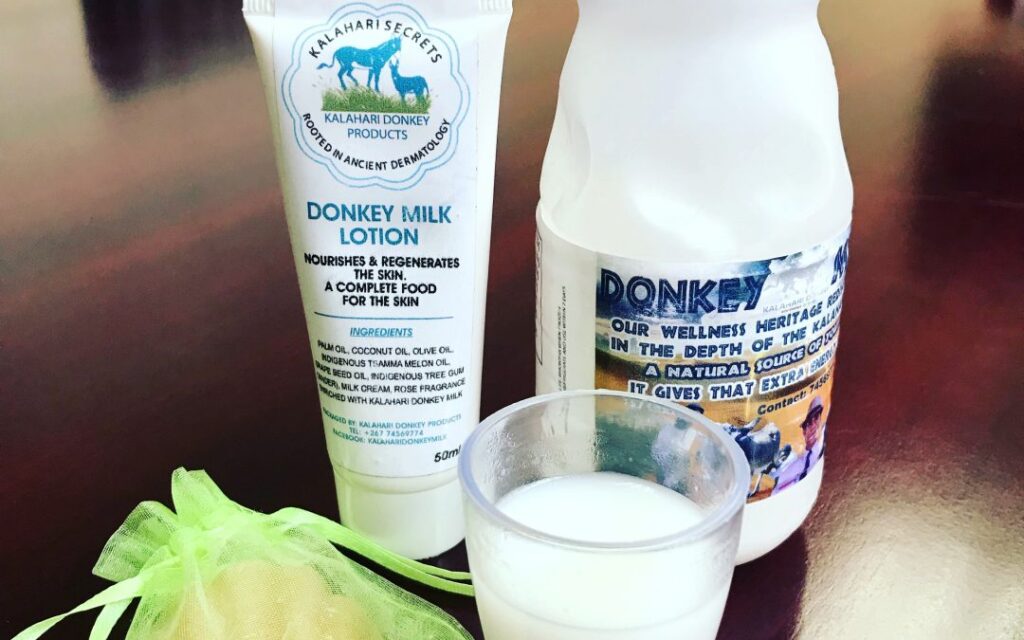CLAIM: Donkey milk is characterized by its purity, containing no bacteria and boasting low fat content… research has indicated that donkey milk contains essential amino acids that support cardiovascular health, help in the treatment of thrombosis, and combat common ailments like colds.
SOURCE: Takuwa Natural Products
VERDICT: Partly True
A Botswana company is seeking to expand its growth into Zimbabwe markets. It’s product: donkey milk.
This has led to some mixed reactions, with some saying that Zimbabweans do not have a culture of consuming ‘donkey products’ and others labelling the move as ‘scientifically correct but culturally insane’.
Takuwa Natural Products has been in the industry providing donkey milk and associated cosmetic products since 2016.
Advocates for the use of donkey milk claim that there is a list of illustrious historical figures who used the product for various reasons.
Hippocrates reportedly used it as a treatment for arthritis, coughs, and wounds. Cleopatra is said to have maintained her soft, smooth skin with donkey milk baths. Others say it was rather Pauline Bonaparte (1780–1825) Napoleon’s sister, who used donkey milk for skin care.
According to Taolo Sesupo, the operations manager of Takuwa Natural Products, donkey milk is characterized by its purity, containing no bacteria and boasting low fat content. He says their research has indicated that donkey milk contains essential amino acids that support cardiovascular health, help in the treatment of thrombosis, and combat common ailments like colds.

So where does the commercial spin end and facts begin?
In an article on ‘Donkey Milk and Infant Nutrition’, the authors claim that donkey or mare milk has significant quantities of bioactive molecules, in higher quantities than those found in bovine milk. They say the presence of these bioactive molecules in human milk has an anti-infective action and constitutes a factor that stimulates the immune system of the newborn.
The article goes on to indicate that donkey milk can also prevent cardiovascular disease, ‘Thanks to the presence of omega-3 fatty acids, a regular intake of donkey milk plays a preventive action towards the cardiovascular districts, preventing the formation of atherosclerotic plaques’.
This is supported by another research on ‘Immunological Properties of Donkey’s Milk: Its Potential Use in the Prevention of Atherosclerosis’. This research shows that donkey milk may be useful in the treatment of human immune-related diseases, ‘in particular, nitric oxide induction by donkey’s milk may be very useful in the prevention of atherosclerosis, being a strong vasodilator and an effective antimicrobial agent since pathogens and/or their products may play a proatherogenic role’.
It has emerged that donkey milk compared with that of other animal species, is the nearest to human milk and an excellent substitute for it. Milk from various animal species shows substantial differences in nutritional composition and distinct metabolic effects.
However, before you reach for that glass of frothy and rich donkey milk, other researchers caution that while, donkey milk has demonstrated a low bacterial content, the potential presence of pathogenic species is not excluded, which underlines the importance of heat treatment prior to human consumption. There is a need for pasteurization and strict hygienic measures upon milk production and handling. Quality control measures should be put in place to ensure that the donkey milk sold in the market is safe for human consumption.
The bottom line is that few clinical studies have been performed to establish the multiple benefits of donkey milk in humans. Further research is warranted to evaluate its impacts on health at molecular levels.
Conclusion
The claim that donkey milk is characterised by its purity, containing no bacteria and boasting low fat content has been rated as partly true. Research has shown that it indeed has low fat content compared to cow and human milk. However, it has a low bacterial content, but it is not pure.
While the company claims that their research has indicated that donkey milk contains essential amino acids that support cardiovascular health, help in the treatment of thrombosis, and combat common ailments like colds, other researchers say that not enough clinical trials and research has been carried out for definitive conclusions.
But if you want a glass of donkey milk, go ahead, research is agreed on at least one thing, it can’t hurt.










